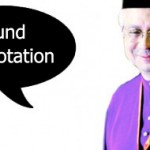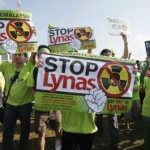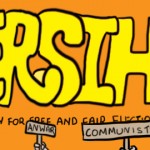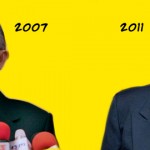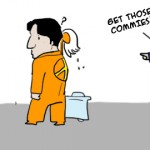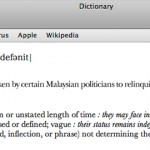ELECTIONS should be won or lost on issues and policies but sadly, that’s not always the case. Personal attacks and mudslinging are a common feature in Malaysian elections. We take a look at some of the arguments that have been made by politicians wanting to trump their opponents in the run-up to GE13.
Found in Quotation
BN vs PR election forecasts
By Gan Pei Ling and Jacqueline Ann SurinAS Malaysia faces the most keenly-contested general election since independence (GE13), what are both the Barisan Nasional and Pakatan Rakyat coalitions saying about their respective chances of forming government?
Squaring Najib’s statements on “pendatang” and the Malay agenda
By Ding Jo-AnnPrime Minister Datuk Seri Najib Razak recently told Chinese Malaysians they are “citizens with full rights” and that those who call them pendatang are “lunatics”. But how do Chinese Malaysians having “full rights” accord with the “Malay agenda” that Najib also claims to champion? To what threat is Najib referring when he warns Malay Malaysians that they may become squatters in their own land? And what has Najib said previously about organisations such as Perkasa that have openly chastised Chinese Malaysians for being ungrateful to the Umno-led government?
Badu’s tattoo taboo (Updated 9 March 2012)
By Shanon Shah(Updated 11pm, 9 March 2012) ON 27 Feb 2012, an apology appeared in The Star regarding a photograph of US R&B singer Erykah Badu used on that day. The photograph showed Badu with body art, including the word “Allah” in Arabic script on her shoulders. Badu was due to perform in Malaysia on 29 Feb […]
Assault on journalists: Whose fault?
By Ding Jo-AnnON 26 Feb 2012, Kwong Wah Yit Poh journalists Adam Chew and Lee Hong Chun were injured in an attack while covering a demonstration in Penang against the Lynas rare earth refinery. Chew and Lee were both hit on the head by a group appearing to be Umno supporters who had gathered to heckle the […]
Theories of Bersih 2.0
By Ding Jo-AnnThe Bersih 2.0 9 July 2011 march drew thousands of Malaysians onto Kuala Lumpur’s streets to call for clean and fair elections. But according to Barisan Nasional (BN) leaders, the government-controlled press and the authorities, that’s not what the march was really about. In the aftermath of the Bersih march, The Nut Graph summarises some of the more popular theories by Bersih’s detractors of why it actually organised the march.
BN vs Bersih: Comparing 2007 and 2011
By Gan Pei LingIS Prime Minister Datuk Seri Najib Razak a prime minister of reform as he’s been portrayed to be? Is he more respectful of human rights and dissenting views compared to his predecessor Tun Abdullah Ahmad Badawi? Is he less or more prone to strong-arm tactics? A comparison of how the government treated Bersih in 2007 and how it is treating Bersih 2.0 in 2011 gives Malaysians and the world an indication of whether things have gotten better under Najib or much worse.
Bersih 2.0: “Illegal”, chaos-causing “communists”?
By Gan Pei LingWaging war against the king. In cahoots with foreign conspirators. Possible communists. Planning to overthrow the government. Illegal T-shirts. Bersih 2.0 seems to embody many evils to the authorities, who have arrested more than 100 in attempts to stop Bersih’s 9 July 2011 march. But have the authorities gone overboard in demonising the rally? What about Malaysians’ constitutional right to freedom of expression and right to peaceable assembly?
Keeping subsidies: Caring or irresponsible?
By Gan Pei LingIs it caring or irresponsible of the government to maintain government subsidies? Our government seems undecided. On one hand, RON95 and diesel prices have been maintained “for the people’s sake”, despite the heavy subsidy cost. On the other hand, electricity tariffs have been raised because it would be “irresponsible” of the government to keep the people happy but make them suffer in the long-term. So, which is it?
When will Taib really go?
By Ding Jo-AnnIN the lead-up to the Sarawak elections, the prime minister and his deputy went all out to convince voters that Chief Minister Tan Sri Abdul Taib Mahmud would step down after the state election because he was “ready”. But what does “after” and “ready” really mean? Is it “someday” as the deputy prime minister has stated or in “two to three years” as Taib has claimed? Clearly, vague rhetoric is useful for politicians to keep their options open especially now that the Barisan Nasional has again secured its two-thirds majority in the state assembly.


